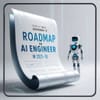Becoming an AI engineer is an exciting career goal, and with the right roadmap, you can achieve it. To get started, you'll need to build a strong foundation in math and programming, particularly in Python. Focus on learning Python syntax, functions, loops, and object-oriented programming, as well as essential libraries like NumPy, Pandas, and scikit-learn.
A strong math foundation is also crucial for AI engineering. Linear Algebra, Probability, and Statistics are essential concepts to master. You can find excellent resources on Khan Academy, MIT OpenCourseWare, and 3Blue1Brown.
Once you have a solid foundation in math and programming, you can move on to learning machine learning fundamentals. Get familiar with supervised and unsupervised learning, neural networks, and deep learning. Andrew Ng's Machine Learning course on Coursera is a great starting point.
As you progress, gain practical experience by working on projects that integrate machine learning models into real-world applications. This will help you develop problem-solving skills and learn how to deploy models at scale. You'll also want to learn about MLOps, which is essential for deploying AI at scale. Learn about model deployment, monitoring, and maintenance using tools like Docker, Kubernetes, and TensorFlow Extended.
Specializing in a domain that interests you, such as Natural Language Processing, Computer Vision, or Reinforcement Learning, will help you develop deeper knowledge and expertise. Finally, prepare for AI/ML job interviews by practicing coding, system design, and machine learning fundamentals.
Remember, becoming an AI engineer takes time, dedication, and continuous learning. Stay updated with the latest developments in the field, and you'll be well on your way to a successful career in AI engineering.


